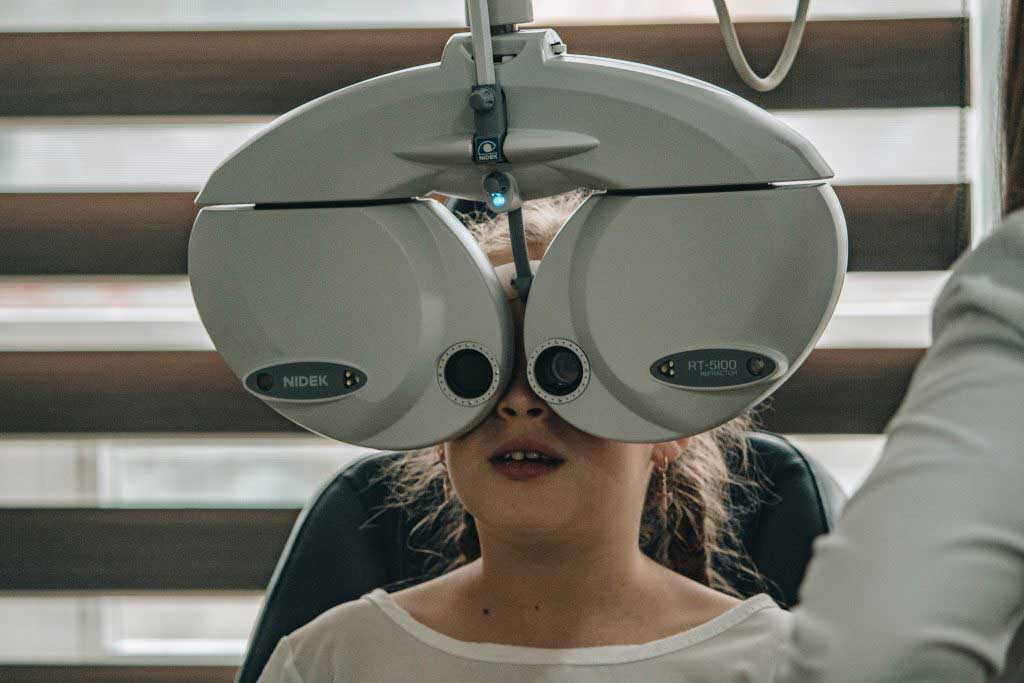One of the most important, but often neglected, health examinations for children is the eye test. Just as adults need ongoing eye tests, children’s eye tests are even more crucial to protect their long term eyesight. It is important to book an appointment with a qualified optometrist or ophthalmologist who can give a full evaluation of your child’s eyes and vision. Here are some questions you should consider when booking a children’s eye test.

Why are children’s eye tests important?
Problems with children’s eyes can easily go undetected and unnoticed by both child and parent for many years. Although severe eye defects are rare, even small problems can impede their development, education, and even personal safety. So, an eye test performed early will be able to detect any issues before they become a risk to your child. Should the specialist find any eye problems, they can then prescribe suitable treatment and support to ensure your child’s ongoing learning.
How often should eye tests occur?
Normally, your child will have a physical examination within 72 hours of birth that should spot any immediate vision problems. Children should then have their first comprehensive eye test between six to eight weeks old. Between one and three years of age, you should have another eye test performed, particularly if there are any developmental concerns. Between four to six years old, just before they start school, they should receive another eye test, followed by at least one eye test each year after.
What happens during an eye test?
Depending on the age of your child the specialist may carry out a number of different tests. However, these are the most common children’s eye tests carried out during an appointment:
- Red, Reflex – Uses an ophthalmoscope to shine a reflection on the back of the eyes. A red reflection indicates normal eyes, while a white reflection could indicate an issue.
- Attention to Visual Objects/Range of Movement – Uses an interesting object (such as a toy) to determine if the child’s eyes follow its direction as well as the range of movement.
- Pupil Reflex – Shines a light to test how the pupils respond to light. If the pupils shrink, then this is normal, if not, then there may be a vision problem.
- Snellen and LogMAR charts – Once children can recognise letters they can use these charts to read out rows of letters of decreasing size.
- Refraction – Your child is given special eye drops to enlarge the pupils. They will then be asked to look at a light or read letters on a chart while different lenses are placed in front of their eyes.
- Colour Vision Deficiency – Uses a number of tests to determine if the child can recognise different colours, such as identifying images made up of dots using two different colours.
What are the common eye conditions in children?
These are some of the problems that can be detected during eye tests:
- Cataracts – Cloudy patches in the lens of the eye.
- Amblyopia – Known as lazy eye, where the vision in one eye is underdeveloped.
- Strabismus – Also known as a squint, where the eyes look in different directions.
- Myopia – Distant objects appear blurry, but close objects can be seen clearly. Also known as short-sightedness.
- Hyperopia – The opposite of myopia: distant items appear clear, but close objects appear blurry.
- Astigmatism – Where the transparent layer at the front of the eye is not perfectly curved.
- Colour Vision Deficiency – Difficulty distinguishing one colour from another.
How can I spot eye problems in my child?
Any of the following can indicate the need for a children’s eye test:
- Eyes pointing in different directions (strabismus).
- Regular complaints of headaches or eyestrain.
- Problems with reading, such as holding the book too close.
- Problems with hand-eye coordination, such as when playing sports.
- An unusual degree of clumsiness.
- Regularly rubbing their eyes.
- Sitting too close to the TV.
- Unable to read notes on the board during class.
If any of these issues occur, you should book an appointment as soon as possible.
Focus on Broadway
Here at Focus on Broadway, we offer comprehensive eye tests for children of all ages that can help detect areas of concern early on. If your child needs corrective lenses then we have a wide range of frames available to suit any budget. For more information on children’s eye tests and kids glasses available, we invite you to get in touch with us today.